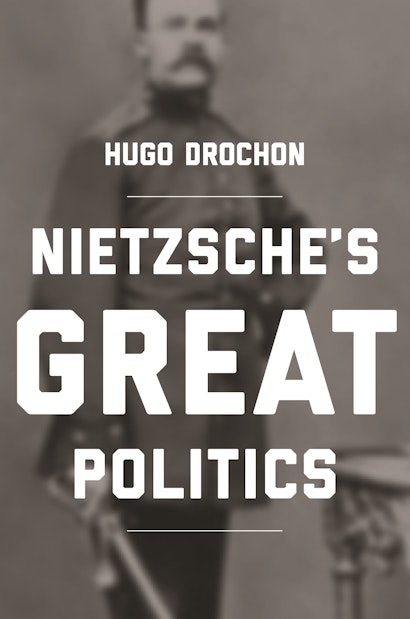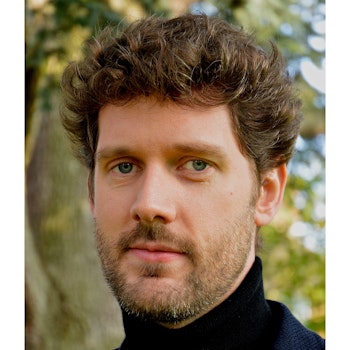"The task that Hugo Drochon sets himself is to reinsert some political content into Nietzsche and show that he had a systematic political theory. The result is a superb case of deep intellectual renewal and the most important book to have been written about him in the past few years."āGavin Jacobson, New Statesman
"There is no lack of contemporary publications that deal forthrightly with Nietzscheās political thinking: these include Hugo Drochonās Nietzscheās Great Politics. "āAlex Ross, New Yorker
"This book is not so much a reclamation of his [Nietzsche's] thinking on the subject as a reconstruction of the development of political thinking in the philosopher's works, so often missed by those who require thinking and expression less profound to make sense of such. Coherent, detailed and balanced."āDaniel Binney, Times Higher Education
"The book achieves its stated goal with aplomb as it follows the development of political ideas in Nietzsche's works, and it deserves to become a standard reference text for advanced students and Nietzsche scholars."āMina Mitreva, Past Imperfect
"In this compelling and accessible study, Drochonāa historian of 19th- and 20th-century political thoughtāargues the affirmative case, contending that Nietzsche articulated a āgreat politics' centered on the unification of Continental Europe under the aegis of a cultivated, interbred class of superior individuals who would ultimately lead a geopolitical struggle against Great Britain and Russia for world supremacy. . . . One can find lots of books on Nietzsche, but this one stands out for its clarity and excellence."āChoice
"Hugo Drochon sets out to show that Nietzsche had a 'politics' after all. [He] in large part succeeds, and gives an illuminating account of Nietzsche's vision for a unified, cosmopolitan Europe. . . . This is a learned book that does a nice job of situating Nietzsche in his social and political context. . . . Drochonās is a book from which one will learn a great deal, and . . . Will challenge us to reconsider our opinions about Nietzsche and his place in history."āAndrew Huddleston, Times Literary Supplement
"Necessary reading for anyone working on Nietzsche as a political thinker. . . . Drochon provides a fine way into these questions surrounding Nietzsche's thought about great politics. He provides a scrupulous account of Nietzscheās political thought and a stimulating argument for a way of taking Nietzsche seriously from a political point of view."āBarry Stocker, Los Angeles Review of Books
"A thought-provoking contribution to the debate over Nietzsche's politics. . . . [It] contains plenty to interest the contemporary Nietzsche scholar, providing insight into Nietzsche's political statements and offering a tantalising glimpse into his preparations for a great role in the politics of his age."āSimon Townsend, Contemporary Political Theory
"Drochon's book largely succeeds. . . . He demonstrates that Nietzsche had political considerations that stretched with some consistency across his career, which should be sufficient to call Nietzsche a political philosopher, and, indeed the sort of political philosopher ill-suited to Nazi appropriation."āNatasha Leonard, Dissent
"There is much to recommend in Drochon's bold, erudite, and lucid study of Nietzsche's political thought. In particular, Drochon should be commended for meeting the rigorous demands of a contextualist methodology while also demonstrating Nietzsche's contemporary relevance. Drochon's philosophic interpretation is thus both historically grounded and timely. Nietzsche's Great Politics will surely open up new areas of research and revitalize ostensibly settled questions of interpretation."āPaul Wilford, The Review of Politics
"Nietzscheās Great Politics by Hugo Drochon is one of the most creative and original eļ¬orts to mould Nietzscheās thought to the challenges of our age. Nietzsche always wanted to have creative and critical readers and this book certainly lives up to that ideal."āDamian Valdez, History of European Ideas
"A realist interpretation of Nietzscheās politics . . . well written and readable. . . . While Nietzscheās political analyses of the late nineteenth century act as a well-timed reminder of both the fragility and worth of European integration, the general premises of his political philosophy provide us with highly useful conceptual tools for rethinking many of our political categories."āGulsen Seven, Political Studies Review
"Among the most illuminating studies that have been written on the topic of Nietzsche's political thought. . . .Those who confidently maintain that Nietzsche has no 'politics' will be forced, if not to abandon their view completely, then seriously to reconsider it."āNotre Dame Philosophical Reviews
"It is to the supreme credit of Hugo Drochonās Nietzscheās Great Politics to see that . . . his study succeeds in delivering a well-researched and thoughtful analysis of Nietzscheās 'great politics' in the context of both Nietzscheās writings and their cultural and political settings. . . . A provocative and timely study."āDale Wilkerson, Review of Metaphysics
"Drochonās book is an important contribution to the ongoing debate about the question whether Nietzsche should be regarded as a political thinker. . . . The whole book, which also focuses on Nietzscheās views about the Greeks, the state, democracy, and the relation of democracy to aristocracy, is a carefully construed and well-documented argument that Nietzsche did indeed make a contribution to political thought."āManuel Knoll, Nietzsche-Studien
"A daring and welcome attempt to re-historicize one of the nineteenth centuryās most controversial philosophers, and should be read with great interest by scholars of Nietzsche, as well as students of European culture, thought and politics."āRebecca Mitchell, Politics, Religion & Ideology
"Rigorous in its close reading of the sources and written with great clarity. . . . Drochon also persuasively demonstrates that Nietzscheās thought has a place within the canon of the history of political thought and that his political theory may prove resourceful when dealing with the specters that haunt liberal democracies and market societies today."āDotan Leshem, Politics, Religion & Ideology
"Drochonās book is a stimulating and fascinating contribution to our understanding of Nietzscheās enigmatic writings. Without a doubt, it will become the standard reference work for everyone interested in the philosopherās complex political thought and its many legacies."āUdi Greenberg, Politics, Religion & Ideology
"Hugo Drochon provides an invaluable service by drawing our attention to Nietzscheās political philosophy, which he contends has been either neglected or misunderstood. . . . In a world where liberal and egalitarian pieties seem to be under strain, his views, however disquieting, merit our attention and Drochon is to be congratulated for exploring them in a subtle and sophisticated volume."āJames Chappel, Politics, Religion & Ideology
"A well-written and well-argued account of Nietzscheās political vision that presents itself squarely within the tradition of Cambridge School intellectual history . . . Drochon is entirely right to conclude that Nietzsche does field a relatively coherent vision of political life, and he is also on the mark in his conclusion that Nietzscheās politics remains a politics of the nineteenth century that cannot fully be translated into the present."āChristian J. Emden, Journal of Nietzsche Studies
"In the otherwise crowded field of Nietzsche scholarship, this book has received an unusual and deserved amount of popular attention. In part, this follows from the strong reassertion today of various illiberal voices. Drochonās concluding questions, concerning the purpose of European unity and the role of European elites, are inescapable."āMichael Lang, Journal of Modern History
"Excellent. . . . Even a review essay cannot adequately capture the depth of scholarship and the originality present in [Nietzsche's Great Politics]. . . . Students of Nietzscheās political provocations will want to read [it] in order to see how Nietzsche wrote a politics for the future predicated upon his careful reading of both his predecessors and his contemporaries."āCorey McCall, Comparative and Continental Philosophy
"Hugo Drochon, a distinguished intellectual historian at Cambridge University, has in this brilliant new book pointed to another thinker who believed private protection agencies were possible. This is none other than Friedrich Nietzsche."āDavid Gordon, Mises Institute
"Extraordinary book . . . . Drochon masterfully articulates a credible account of Nietzscheās political action programme. . . . [A] rich, luminous and comprehensive argument."āRenato Cristi, History of Political Thought
āAppropriation by the Nazis and, more recently, the alt-right has overshadowed Nietzscheās own political theory. He titled his final notebook āGreat Politicsā and Drochon has done the philosopher a great service in stripping away historical accretions to restore his political philosophy to its own context. We see the highly important contribution he made to his own time, but we can also take lessons for ours, as he questions the nature of truth in a self-fashioning age. An important book, beautifully written.āāSue Prideaux, author of I Am Dynamite!: A Life of Friedrich Nietzsche
"This excellent, illuminating book deserves to become a standard work for all scholars and students of Nietzsche, and it will be indispensable to scholars of his political thought. Hugo Drochon provides a great deal of new insight into Nietzsche's work as well as its relevance in the contemporary world."āTamsin Shaw, New York University
"The crucial task of discerning a political philosophy in Nietzscheās views on the misapplication of the will to power in an exercise of domination over others eluded scholars until Hugo Drochon. His book Nietzsche's Great Politics brings the necessary empirical detail to this task, which it accomplishes splendidly. The book is crystal clear, original, and persuasive."āStanley Corngold, professor emeritus, 91ĢŅÉ« University


